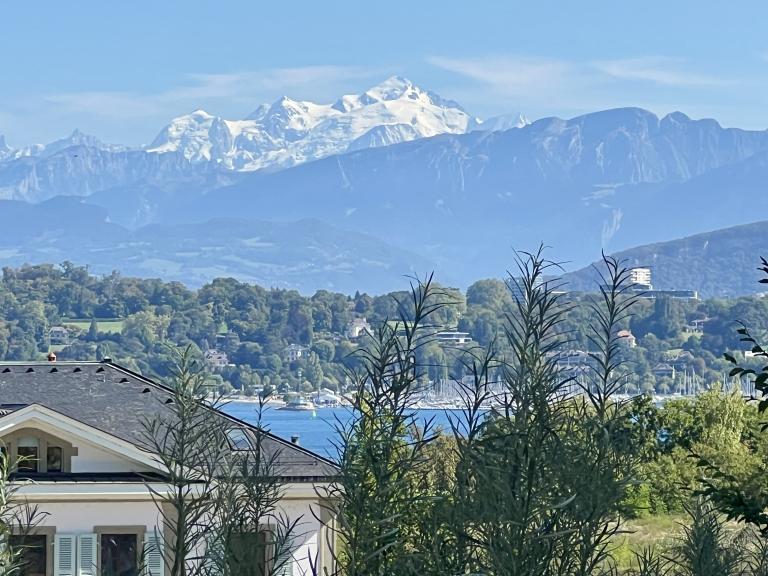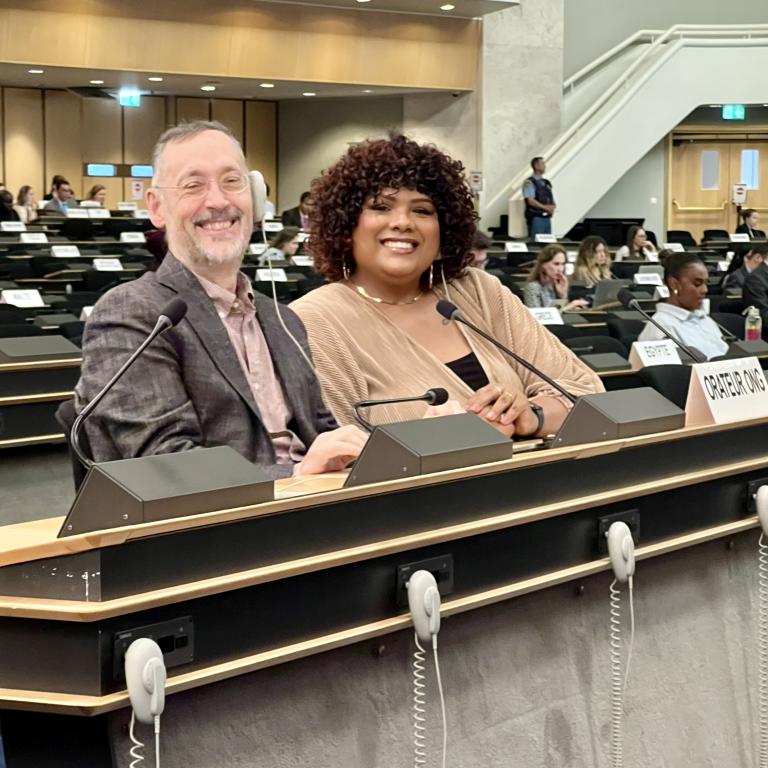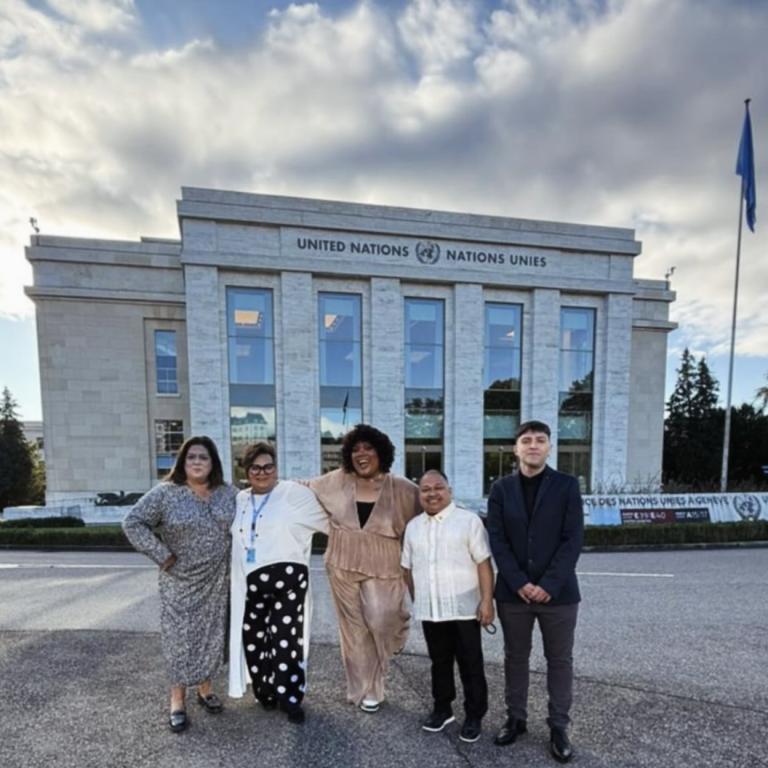
Insights
A Rare Moment of Joy. Then the Fight for Intersex Human Rights Carries On
Region(s)
TOPIC(s)
Type
Commentary
Author(s)
Publish Date
October 14, 2025
Share
They stood confidently waiting, like old friends welcoming us back. I'm not a particularly spiritual person, but those majestic Swiss Alps on the horizon, towering over the United Nations in Geneva, continue to serve as a beacon of hope, reminding me that there is something bigger than all of us out there.

Eighteen months after the UN Human Rights Council passed its first-ever resolution on intersex people’s human rights, I found myself back in Geneva for the Council’s 60th session with fellow intersex human rights defenders, assembling to continue our advocacy and participate in the launch of a milestone UN report on combating discrimination, violence, and harmful practices against intersex persons. People like us. Each of us had traveled, some a great distance, to bear witness to the historic occasion and spend the week advocating for an end to the erasure of our very existence through harmful medical practices, infanticide, and laws and policies that deny our truth and violate the human rights of nearly 2% of the global population.
Seated in the impressive UN Assembly Hall, Mauro Cabral Grinspan, a longtime global intersex activist whispered to me, “I can’t believe this is finally happening.” He, along with a few other intersex advocates seated to witness the event, had been advocating for the recognition of intersex rights at the UN for two decades. The intensity of the moment loomed large, one of the scarce instances in the life of an activist where we can pause and take stock of the progress made - and celebrate. Advocacy to end violence and discrimination against intersex people takes time, tenacity, and patience. It demands that intersex activists share personal stories of physical and emotional pain and suffering, shouldering the burden of repeated trauma over and over again. While advocacy can provide activists with rare moments of joy and personal satisfaction, like we experienced in that UN hall, most of us collectively do this work to improve the lives of tomorrow’s intersex children. We sacrifice and fight for a time when a child born with intersex traits will be welcomed into the world without the risk of harm solely because of their innate bodily variations.

On this momentous day, I was privileged to provide an oral intervention from the floor of the Assembly Hall on behalf of Outright:
Quote from Kimberly M. Zieselman
My name is Kimberly Zieselman, and I am an Intersex woman from Outright International. We are based in the U.S. but support the protection of intersex human rights across the globe. In every single country, intersex children face irreversible physical and emotional harm. This harm is caused by genital surgeries that are recognised by international experts as torture: torture that is carried out in medical settings. It is also caused by the abuse and abandonment by family members who do not accept their intersex child, and in some cases, we see even infanticide. There are many misunderstandings about intersex people. Intersex is not an identity: it is our actual, physical bodies that we were born with. Kids like me - those born with atypical physical sex traits – are not a problem to be fixed. With appropriate human rights-compliant care and support, we live fully and thrive! For us to thrive, however, we must stop the societal and governmental-sanctioned violence against infants and children simply for being born with bodies others perceive as “unacceptable.” I call upon every person – diplomats, human rights defenders, religious persons, family members, medical practitioners – anybody that cares about children, access to healthcare, and all people being free from violence – to join our global movement to end this senseless, preventable harm.
Other intersex activists also spoke their truth to power, bringing to bear the voices of a diverse, vibrant global movement. Each of us celebrated the new report that validates our collective lived realities and recognizes our human rights. The report makes several concrete recommendations to member states, including:
- Prohibiting medically unnecessary surgeries;
- Ensuring access to intersex-affirming healthcare, childhood medical records, counseling, and peer support;
- Explicitly including sex characteristics as a prohibited grounds of discrimination in comprehensive anti-discrimination legislation;
- Ensuring that intersex children are registered at birth and that the birth registration process does not require nor encourage medically unnecessary interventions;
- Conducting public awareness-raising campaigns to combat misconceptions, misinformation, and stigma, and provide training to policymakers and public officials in healthcare, schools, law enforcement, and the judiciary; and
- Collecting disaggregated data on intersex persons with regard to experiences of discrimination, violence and other harmful practices.

Now, it is time to refocus on the continued struggle for bodily autonomy and freedom from discrimination and violence. Armed with the credibility of an official UN report and resolution, we go back to our home countries, resume our busy lives, continue to share our stories, and disseminate this new UN report far and wide, hoping to not only raise awareness but to provoke enough outrage to instigate change. Enough outrage to secure new allies and muster desperately needed resources to fuel our activism.
The world has changed immensely since the passage of the UN resolution in April 2024. Growing authoritarianism and anti-gender forces have shifted the landscape in unfavorable ways, including through the loss of crucial funding, impacting activists across the globe. As an American intersex activist, I feel much less safe than I did just a year ago. The attempted erasure of my very existence by President Trump on his first day in office was just the beginning. Global intersex activists are navigating increasingly hostile governments and battling the same decades-old misperceptions and ignorance at every turn. More than ever, intersex human rights defenders at the national and global levels need support - and rest assured, the intersex rights movement will not give up.
Personally, I will try to hold onto that special moment of joy we collectively experienced at the UN in Geneva last month, and continue work in solidarity with incredible intersex activists from every region to propel forward the protection and well-being of intersex children everywhere.

Take Action
When you support our research, you support a growing global movement and celebrate LGBTIQ lives everywhere.
Donate Now